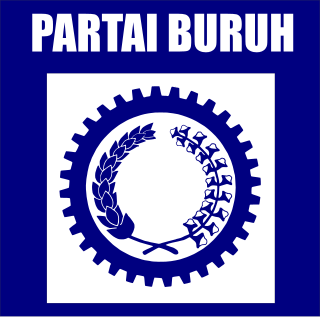
The National Mandate Party, frequently abbreviated to PAN, is an Islam-based political party in Indonesia.
The Prosperous Peace Party was a Christian-democratic political party in Indonesia. It portrayed itself as the reincarnation of Parkindo, the Indonesian Christian Party, which contested the 1955 and 1971 elections. Although it was initially founded by Christians, the party was open to all religions, and 21 of its candidates in the 2009 legislative election were Muslim.

The Justice and Unity Party formerly known as Indonesian Justice and Unity Party is a political party in Indonesia.

The Indonesian National Populist Fortress Party was a political party in Indonesia. The founder, Eros Djarot was dissatisfied with the Indonesian Democratic Party of Struggle, which refused to allow him to stand as chairman against Megawati Sukarnoputri at the party conference in 2000. Eros then formed the Bung Karno National Party, named after Indonesia's first president Sukarno. As the law did not allow the use of national figures in party names, this was changed to the Freedom Bull National Party.
The Democratic Nationhood Party was a political party in Indonesia. It was established in 2002 as the United Democratic Nationhood Party by a group of intellectuals including Ryaas Rasyid and Andi Mallarangeng, formerly president Susilo Bambang Yudhoyono's spokesman, who were disatissfied with the progress of the reform movement following the Fall of Suharto.

The Indonesian Democratic Vanguard Party was a political party in Indonesia. It was a continuation of the Indonesian Democratic Party (PDI), one of the two state-approved parties during the New Order. After the PDI failed to achieve enough votes in the 1999 legislative elections to qualify for the 2004 elections, it changed its name to the Indonesian Democratic Vanguard Party. In 2004 it won one seat. The party contested the 2009 legislative election, but won only 0.13 percent of the vote, less than the 2.5 percent electoral threshold, thereby losing its only seat in the People's Representative Council. Following its poor result in the 2009 vote, the party joined nine other smaller parties to form the National Unity Party. The party also attempted to contest the 2014 elections, but failed to fulfill the criteria set by the General Elections Commission, and along with nine other parties who also failed to qualify, decided to merge into the People's Conscience Party (Hanura).

The Indonesian National Party of Marhaenism is a minor political party in Indonesia founded by former Indonesian National Party (PNI) member Supeni in 1995 before changing to the current incarnation in 2002. The party is headed by Sukmawati Sukarnoputri, daughter of national founder Sukarno.
The Democratic Renewal Party was a political party in Indonesia. It was established in 2005 by former members of the Indonesian Democratic Party – Struggle (PDI-P) who were once close aides of party leader Megawati Sukarnoputri. Following the 2005 PDI-P congress, differences appeared over the nature of democratic methods within the party. A group of people, including Petrus Selestinus, took the view that although the PDI-P was a modern political party, it still used the old authoritarian methods such as giving absolute prerogative rights to the party chairman and having only one candidate for senior positions. This group then established the Democratic Renewal Party. Unlike the PDI-P, it had a system of collective leadership, with 35 people forming the national leadership.
The Patriot Party was a political party in Indonesia. It was established as the Pancasila Patriot's Party as a result of a deliberations at the sixth national conference of the Pancasila Youth organization in 1996. At the time, the organization's political goals were channeled by Golkar, but in its conference the year after the 1998 Fall of Suharto, Pancasila Youth withdrew from Golkar. The conference also decided the time was right to establish a political party, and it was declared on 1 June 2001, the anniversary of Sukarno's Pancasila speech. The party was officially and legally established two years later. Thus the Patriot Party was described as the political wing of the Pancasila Youth.

The National People's Concern Party was a political party in Indonesia, headed by Amelia Achmad Yani, daughter of General Ahmad Yani. It contested the 2009 elections, but won only 1.2 percent of the vote, less than the 2.5 percent electoral threshold, so gained no seats in the People's Representative Council. The party intended to contest the 2014 elections, but failed to fulfil the ctteria set by the General Elections Commission, and along with nine other parties who also failed to qualify, decided to merge into the People's Conscience Party (Hanura).

The Prosperous Indonesia Party was a political party in Indonesia. It contested the 2009 elections, but won only 0.3 percent of the vote, less than the 2.5 percent electoral threshold, meaning it was awarded no seats in the People's Representative Council. Following its poor result in the 2009 vote, the party joined nine other smaller parties to form the National Unity Party. The party also attempted to contest the 2014 elections, but failed to fulfill the criteria set by the General Elections Commission, and along with nine other parties who also failed to qualify, decided to merge into the People's Conscience Party (Hanura).
The Indonesian Democratic Party of Devotion was a political party in Indonesia. It was one of two Christian parties contesting the 2009 elections.

The Indonesian Youth Party was a political party in Indonesia. It contested the 2009 elections with a platform of motivating young people to participate in national development. The party won only 0.4 percent of the vote, less than the 2.5 percent electoral threshold, meaning it was awarded no seats in the People's Representative Council. Following its poor result in the 2009 vote, the party joined nine other smaller parties to form the National Unity Party. The party also attempted to contest the 2014 elections, but failed to fulfill the criteria set by the General Elections Commission, and along with nine other parties who also failed to qualify, decided to merge into the People's Conscience Party (Hanura).

The Archipelago Republic Party (Indonesian: Partai Republika Nusantara) was a political party in Indonesia established in 2007. It contested the 2009 election on a platform of simplification of the bureaucracy, reforms to education and prioritization of maritime development. However, it won only 0.6 percent of the vote, less than the 2.5 percent electoral threshold, meaning it was awarded no seats in the People's Representative Council. The party intended to contest the 2014 elections, but failed to fulfill the criteria set by the General Elections Commission, and along with nine other parties who also failed to qualify, decided to merge into the People's Conscience Party (Hanura).

The Regional Unity Party was a political party in Indonesia. The party was founded as a result of the reforms to the People's Consultative Assembly, Indonesia's supreme law-making body which used to consist of the elected People's Representative Council plus members appointed from the regions and functional groups. When these unelected members were removed in 1999 after the first democratic elections following the fall of Suharto, several regional representatives' led by Oesman Sapta, tried to reestablish the Regional Representatives Faction. The members of this faction took the view that the elected Regional Representatives Council, which replaced the unelected members of the People's Consultative Assembly, would not be effective as it was too small. They therefore decided to establish a political party to represent the interests of the regions.
The Freedom Party was a political party in Indonesia. It was established in 2002 as a reaction to the disappointment felt by several economic activists to the failure of the new Indonesian parties established after the end of the New Order regime to make meaningful changes to the political system. Rather than fighting for political aims, the party focus is on bringing about a people's economy. The three main principles of the party were nationhood, rule by the people and independence.
The Indonesian Nahdlatul Community Party is a minor conservative political party in Indonesia.

The Labour Party was a political party in Indonesia. It had its origins in the Indonesian Prosperous Laborers organization (SBSI), which in 1993 threw its support behind the Indonesian Democratic Party (PDI) as a vehicle for its political aspirations. When the PDI split in 1996, it allied itself with the breakaway faction led by Megawati Sukarnoputri, which led to it coming under pressure from the New Order government of President Suharto. On 30 July 1996, SBSI chairman Muchtar Pakpahan was detained on subversion charges. Following the fall of Suharto in 1998, the SBSI became disillusions with Megawati's now renamed Indonesian Democratic Party – Struggle and decided to establish its own party, the National Labour Party. After the failure in 1999 election, the party changed its name to Social Democrat Labour Party. The party stood in the 2004 Indonesian legislative election, but won only 0.6 percent of the vote and no legislative seats. Party chairman However, the party has 12 representatives in provincial assemblies. The party subsequently changed its name to the Labour Party.

The Aceh Unity Party is a regional political party in Indonesia. The party's first leader was Farhan Hamid, a member of the legislature from the National Mandate Party (PAN). It contested the 2009 elections in the province of Aceh, but won only 16,602 votes, 0.77% of the Aceh vote. It failed to qualify for the 2014 elections.












